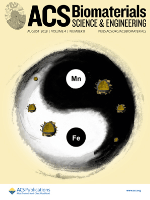
Regenerative Biomaterials
metrics 2024
Pioneering Innovations in Tissue Engineering
Introduction
Regenerative Biomaterials, published by Oxford University Press, serves as a premier platform for the dissemination of innovative research in the rapidly evolving field of biomaterials. Since its inception in 2014, this esteemed open-access journal has fostered a collaborative and diverse scientific community, providing free access to impactful articles that enhance our understanding of regenerative medicine and tissue engineering. With a commendable impact factor and ranking within the top quartiles of both Biomedical Engineering and Materials Science, it is recognized for its rigorous peer-review process and high-quality publications. The journal aims to bridge the gap between fundamental research and applied sciences, promoting advanced studies that contribute to clinical applications and regeneration strategies. Researchers, practitioners, and students alike are encouraged to engage with the journal’s content to foster interdisciplinary collaboration and drive future innovations in the biomaterials domain.
Metrics 2024
 0.99
0.99 5.60
5.60 5.70
5.70 40
40Metrics History
Rank 2024
Scopus
IF (Web Of Science)
JCI (Web Of Science)
Quartile History
Similar Journals

Biomaterials Advances
Exploring the Future of Bioengineering with BiomaterialsBiomaterials Advances is a premier journal published by Elsevier, dedicated to the rapidly evolving field of biomaterials. Established in the United Kingdom, this open-access journal aims to disseminate high-quality, peer-reviewed research that explores innovative biomaterial designs and their applications in bioengineering and biomedical engineering. With an impressive 2023 impact factor reflected in its Q1 rankings across multiple categories—including Bioengineering, Biomaterials, and Biomedical Engineering—Biomaterials Advances stands out as a critical platform for scholars and practitioners faced with advancing technologies and methodologies in the realm of materials science. Covering a broad range of topics, from biocompatibility to tissue engineering, this journal provides an inclusive forum for researchers seeking to contribute to the field. Its Scopus rankings further affirm its position as a leading resource, with notable standings in Biomedical Engineering (Rank #13), Biomaterials (Rank #8), and Bioengineering (Rank #11), all within the top percentiles. Researchers and students alike are encouraged to contribute and engage with the latest findings and innovations in biomaterials through this valuable publication.

Journal of Functional Biomaterials
Elevating Standards in Biomedical Engineering ResearchJournal of Functional Biomaterials is a prominent peer-reviewed journal dedicated to the innovation and application of biomaterials, covering vital fields such as biomedical engineering and materials science. Published by MDPI in Switzerland, this Open Access journal has been serving the academic community since 2010, allowing unrestricted access to groundbreaking research. With an impressive Q2 ranking in both Biomaterials and Biomedical Engineering for 2023, it stands as a significant contributor to the fields it represents. Researchers will find the journal's focus on functional biomaterials particularly relevant, as it encompasses a diverse range of studies aimed at enhancing the performance and applicability of biomaterials in medical contexts. The journal's commitment to disseminating high-quality research fosters collaboration and innovation among professionals, making it an essential resource for anyone involved in this dynamic area of study.

Gels is a distinguished, peer-reviewed journal published by MDPI, focusing on the innovative field of gels and their myriad applications across disciplines such as bioengineering, biomaterials, and organic chemistry. Since its inception in 2015, this Open Access journal has provided a platform for researchers to disseminate cutting-edge findings, enabling wider visibility and impact for their work. Based in Switzerland, Gels has firmly established itself within the academic community, achieving notable recognition as evidenced by its recent Q1 ranking in Polymers and Plastics, and multiple Q2 placements in related categories, demonstrating its relevance and importance in the field. The journal serves as a vital resource for professionals and scholars aiming to engage with the rapidly evolving research landscape surrounding gel technologies, making significant contributions to sustainable materials, drug delivery systems, and much more. With its commitment to Open Access, Gels ensures that research findings are readily accessible to all stakeholders, fostering collaboration and advancement in science and engineering fields.

ACS Biomaterials Science & Engineering
Innovating the Intersection of Science and MedicineACS Biomaterials Science & Engineering, published by the American Chemical Society, serves as a premier platform for the latest advancements and research in the fields of biomaterials and biomedical engineering. With an impressive impact factor and a strong reputation reflected in its ranking—Q2 in Biomaterials and Q1 in Biomedical Engineering—the journal attracts a diverse and engaged readership. Since its inception in 2015, it has aimed to foster innovation by publishing high-quality research articles, reviews, and perspectives on the synthesis, characterization, and application of biomaterials. Researchers and professionals benefit from the journal's rigorous peer-review process and its focus on translational science, making it essential for those looking to stay at the forefront of biomaterials research. Located in Washington, DC, USA, the journal plays a pivotal role in connecting academic and industrial sectors, ultimately driving advancements that impact biomedicine and related fields.

JOURNAL OF BIOMATERIALS SCIENCE-POLYMER EDITION
Transforming biomedical applications with cutting-edge biomaterials.JOURNAL OF BIOMATERIALS SCIENCE-POLYMER EDITION, published by Taylor & Francis Ltd, is a distinguished scholarly journal dedicated to the exploration of biomaterials and their applications in various fields such as bioengineering, biomedical engineering, and biophysics. With an ISSN of 0920-5063 and an E-ISSN of 1568-5624, this journal offers a platform for researchers and professionals to share innovative findings and methodologies that advance the science of polymer-based biomaterials. The journal's impact within the academic community is underscored by its notable Scopus rankings, including a Q2 status in both Biomedical Engineering and Biophysics as of 2023, reflecting its significant contribution to advancing knowledge and practice in these fields. The scope of the journal spans from fundamental research to applications in medical devices and regenerative medicine, ensuring comprehensive coverage of the latest trends and breakthroughs. Although it does not currently offer open access options, the journal remains a pivotal resource for students, researchers, and professionals committed to the development and application of biomaterials in healthcare. For further details, the journal is based in Abingdon, United Kingdom, at 2-4 Park Square, Milton Park, OX14 4RN.

JOURNAL OF MATERIALS SCIENCE-MATERIALS IN MEDICINE
Shaping Medical Technologies with Advanced Materials ResearchJOURNAL OF MATERIALS SCIENCE-MATERIALS IN MEDICINE is a leading peer-reviewed journal published by Springer, dedicated to advancing the field of biomedical materials science. With an ISSN of 0957-4530 and E-ISSN 1573-4838, this Open Access journal has been committed to providing researchers and professionals with freely accessible, high-quality research since 2021. It features an extensive scope spanning bioengineering, biomaterials, biomedical engineering, and biophysics, reflecting its significant impact within these interdisciplinary domains. Recognized within the Q2 category of the 2023 rankings in multiple fields, the journal proudly positions itself as a crucial resource for innovative materials that contribute to advancements in medical applications. With impressive Scopus rankings, including 26th in Biophysics and 40th in Materials Science for Biomaterials, researchers, students, and industry professionals alike can rely on this publication for cutting-edge insights that drive the future of medical materials and technologies. Based in Dordrecht, Netherlands, the journal provides a vibrant platform for sharing groundbreaking discoveries and fostering collaborative research among a global audience.

Biomedical Materials
Bridging Biology and Engineering for Medical Breakthroughs.Biomedical Materials, published by IOP Publishing Ltd, is a premier journal dedicated to the rapidly evolving field of biomedical engineering and materials science. With a robust impact factor showcasing its influence, this journal serves as a vital platform for disseminating pioneering research from 2006 to 2024. Covering an array of interdisciplinary topics—ranging from biomaterials to bioengineering and applied chemistry—the journal consistently ranks in the second quartile across multiple categories including Bioengineering (Q2), Biomaterials (Q2), and Biomedical Engineering (Q2) as of 2023. Researchers, professionals, and students alike benefit from its contributions, exploring innovative solutions at the intersection of biology and material science. Although not an Open Access journal, Biomedical Materials remains essential in advancing our understanding and facilitating discussions surrounding state-of-the-art materials that revolutionize medical applications and enhance patient care.

JOURNAL OF BIOMATERIALS APPLICATIONS
Advancing the frontier of biomaterials research.JOURNAL OF BIOMATERIALS APPLICATIONS, published by SAGE PUBLICATIONS LTD, serves as a pivotal platform for the dissemination of cutting-edge research in the field of biomaterials and biomedical engineering. With an ISSN of 0885-3282 and an E-ISSN of 1530-8022, this journal has been a respected venue for scholarly communication since its inception in 1986. Aiming to provide comprehensive insights into the applications of biomaterials, this journal publishes high-quality articles that explore innovative materials and methodologies, thereby fostering advancements in medical technology and tissue engineering. The journal consistently ranks in the third quartile (Q3) for both Biomaterials and Biomedical Engineering categories, strengthening its position among the noteworthy academic resources available today. With a dedicated readership comprising researchers, industry professionals, and students, JOURNAL OF BIOMATERIALS APPLICATIONS plays a vital role in supporting knowledge exchange and scientific progress within these dynamic fields.

JOURNAL OF BIOMEDICAL MATERIALS RESEARCH PART B-APPLIED BIOMATERIALS
Fostering Collaboration in Biomedical Engineering ExcellenceJOURNAL OF BIOMEDICAL MATERIALS RESEARCH PART B-APPLIED BIOMATERIALS, published by Wiley, is a leading journal in the field of biomaterials and biomedical engineering, with an impact factor reflected in its relevant Scopus rankings—including a Q2 position in Biomedical Engineering and Q3 in Biomaterials for 2023. This journal, with ISSN 1552-4973 and E-ISSN 1552-4981, serves as a vital platform for disseminating pioneering research and innovative applications of biomaterials. Positioned in the United States, it aims to bridge the gap between material science and biological applications, fostering collaboration among researchers, professionals, and students dedicated to advancing technology in healthcare. With a convergence of studies from 2003 to 2024 and a growing focus on open access, the journal ensures greater visibility and accessibility for groundbreaking research. Join us in exploring the dynamic field of biomaterials, as we push the boundaries of science and engineering for improved patient outcomes.

Tissue Engineering and Regenerative Medicine
Advancing the Frontiers of Healing and InnovationTissue Engineering and Regenerative Medicine, published by the Korean Tissue Engineering Regenerative Medicine Society, is a distinguished journal focusing on the interdisciplinary fields of tissue engineering, regenerative medicine, and related biomedical innovations. With an ISSN of 1738-2696 and an E-ISSN of 2212-5469, this journal disseminates cutting-edge research and advancements pivotal to developing therapeutic strategies that improve tissue function and repair. As a testament to its scholarly impact, it holds a Q2 ranking in both Biomedical Engineering and Medicine (miscellaneous) categories, reflecting its influence and relevance within the scientific community, particularly with a Scopus rank placing it in the 82nd percentile among similar journals. Although the journal does not offer open access, it provides vital insights and knowledge to researchers, professionals, and students involved in the quest for innovative solutions in medical science and engineering. With its convergence years extending from 2008 to 2024, the journal continues to be an essential platform for the dissemination of high-quality research that drives the field forward.